By Koh Lay Chin | The Nut Graph,
WITH five decades under his belt as an actor, director, drama teacher, voice-over artiste and writer, Mano Maniam is best known as a local theatre and television veteran. But Mano, 65, is more than just about theatre. In many ways, he is a modern-day renaissance man.
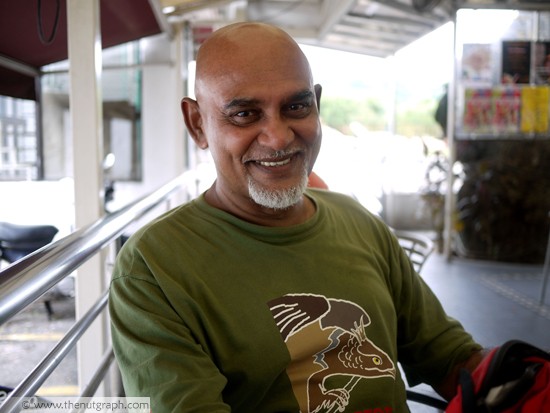 He has been a teacher and scholar at both local and American universities, and was the recipient of the Fulbright Distinguished Artiste Award in 2000. On top of that, he’s a keen environmentalist, having been a long-time member of the Environmental Protection Society of Malaysia, and a former director of the Centre for Environment, Technology and Development Malaysia.
He has been a teacher and scholar at both local and American universities, and was the recipient of the Fulbright Distinguished Artiste Award in 2000. On top of that, he’s a keen environmentalist, having been a long-time member of the Environmental Protection Society of Malaysia, and a former director of the Centre for Environment, Technology and Development Malaysia.
In an interview with The Nut Graph on 15 July 2010 in his neighbourhood Brickfields, Mano explains why he has much hope for the country.
TNG: When and where were you born?
I was born in Ipoh in 1945, at the tail end of World War II. My father was the only son of immigrant parents, and he was in his mid-teens when the war broke out. He was part of the Indian National Army, which was against the British in India.
Sometime around 1943, there was this big move by Japan to build a railroad from Japan to India, with the intent of entering and saving the country from the British. My father was very enthusiastic. Eighteen at the time, he wanted to go up to this railway and be part of this movement, like many Southeast Asians.
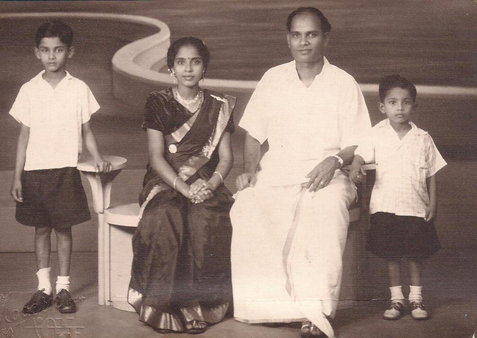 My grandmother heard that all bachelor volunteers were being sent. So she thought that if she got him married off, he would be spared from being called up or from being on the front line. And so, the search was immediately on the next day to look for a suitable young Indian girl to marry my father.
My grandmother heard that all bachelor volunteers were being sent. So she thought that if she got him married off, he would be spared from being called up or from being on the front line. And so, the search was immediately on the next day to look for a suitable young Indian girl to marry my father.
As for my mother, she was a young, pretty girl, and her parents were scared because anyone who was pretty and young were (shrugs) for the Japanese. She was sent to her grandmother’s homestead in Kopisan outside Ipoh, away from prying eyes. But one day, a Japanese patrol was seen in the vicinity. Right away, [the family] started looking out for a suitable male.
So both families met, and there was an immediate liking. In the second meeting, my 18-year-old father and 14-year-old mother spied each other and nodded their heads. Two years later, I was born.
Both my parents’ sides were from what is now northern Tamil Nadu. I think I am the last generation which still has some kinship links. If you consider a Malaysian as one born here, then I am a second-generation Malaysian through my father, and third-generation through my mother.
What are some of the stories you hold dear, or which have made an impact on you?
The real education came from the people around me, including my family. There was communal living and there were always other children about the same age group within and outside the extended family. The war was just over, and there was a baby boom.
We learnt among our peers. I remember clearly when I was four or five. We were still in the 40s, there was nothing much to do. There was the Saturday night tamu, predecessor to today’s night markets. People would bring all their farm produce and sell them under carbide lamps there, and boys would meet girls.
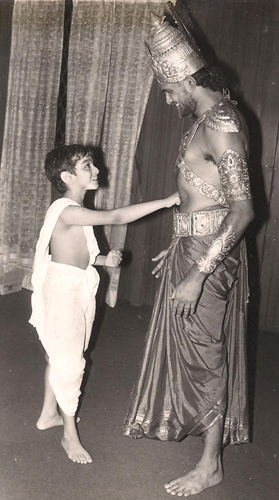 The main attraction was the sandiwara performances on a central raised stage, incandescent lighting and all. Us boys from the neighbourhood would faithfully turn up, hold on to the edges of the stage, and let our senses gobble up the motions, stories, colours and sounds from bangsawan, mak yong and dikir barat to the chronicles of Hang Tuah.
The main attraction was the sandiwara performances on a central raised stage, incandescent lighting and all. Us boys from the neighbourhood would faithfully turn up, hold on to the edges of the stage, and let our senses gobble up the motions, stories, colours and sounds from bangsawan, mak yong and dikir barat to the chronicles of Hang Tuah.
That’s when my theatre started – the interest in the arts, those transformations and the magic. Us boys would always get together to re-enact what we saw, putting our little twists here and there. That is where I realised the importance of storytelling, because it is through stories that we pass on our cultures, values and attitudes, our histories, fears, passions and everything that makes us human.
How did your childhood affect your identity as a Malaysian?
I had to be reminded later as we grew up that Hamid was actually Malay, and that my best friend Ah Ching was Chinese. All these things were later-day realisations.
It is true when people say that we grew up in a time when it didn’t matter one bit. We would go to each others’ homes and we were part of the same thing. Everyone spoke Malay as the common language, and each had his [or her] own language; and soon, we were able to speak in English when we started schooling, and the whole world unfolded [before] us.
And then came Independence, which sort of put grid lines on this emerging fabric. You are in this square, you cannot go into that square. You need to have this amount of application forms to go to the next point. PSD (Public Service Department) scholarships, for example. Everything now needed permissions, barriers, transitions, jumping through hoops. Bribing, prostituting yourself one way or the other in order to get to where you wanted to be.
Whatever I am, whatever gained, learned, or experienced, is a direct or indirect consequence of my growing up in this land, which became mine [and then I became hers]. I saw it happening, I was part of that process. I feel it a prime duty to plough back whatever I have learnt to others who missed that process – the transition from a colonial possession to a new independent modern nation.
I feel planted here. I’m a tree with deep roots, like many people, like (environmentalist) Gurmit Singh and others. You are not going to budge us. You are not going to bring in a silly OSA (Official Secrets Act) or a water canon to change our minds.
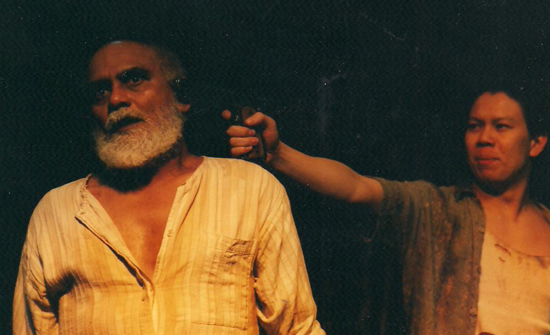 What kind of barriers or “jumping through hoops” did you experience?
What kind of barriers or “jumping through hoops” did you experience?
The first time there was a shock to my system was when I was a first-year undergraduate of Universiti Malaya. In those days, they had this infamous, horrible thing called a Certificate of Suitability, which one needed to join university. It had to be given by the nearest police station to your house. How could a police [officer], who did not know you, tell [if] you were suitable for education? What right has anyone to tell me whether I have the right to education or not?
The second shock was when I was in university and active in sports. I became UM’s football goalkeeper, and the team was going to Thailand to play. We had to apply for a group passport. But I was cut off. I was told by immigration officers that I was a stateless person. My parents did not have their original birth certificates which were lost in the war, and even though they had statutory declarations and I had my original birth certificate, I was not eligible to be a citizen. And so [my team] went to Thailand, and I didn’t.
How did that affect you?
It affected me because up till that time, my generation was it, man. We were the first generation of people who went to university, and even though it didn’t cost very much, my family had to scrimp and save to get me there. And suddenly you get a slap in the face to say you’re out.
Nobody was willing to help me; they were nasty. That had an indelible effect on me. It did not make me hate the system as much as it made me want to change the system. I didn’t want others to go through it.
What gives you hope for this country?
All said and done, we Malaysians are actually a bunch of pragmatists. We compromise, and we have this ability to avoid self destruction, like a cat falling on its feet. We have never seen war, or real deprivation.
Our 13 May was one day’s blast in Baghdad. Over there, it happens three times a week, and here we have that one blot in our collective memory. Since then, we have learnt how to cope with it, despite the Perkasas and ex-prime ministers who have perverted views of the collective Malaysian miasma.
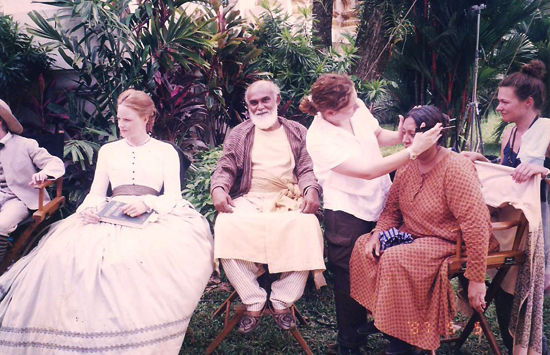 My academic forte is actually cultural anthropology, and in 1976, I said that by the 21st century, we would become the world’s laboratory in the creation of a global citizen. I called him [or her] the cultural quadrophile. The quadrophile is Western-thinking, speaks in English, knows Shakespeare. He [or she] likes Chinese food, knows how the Chinese think and has their inventiveness. He [or she] also understands the philosophy and the tastes of the Indians and the vast cultural base that they come from. Lastly, he [or she] has access and the password to Mesopotamia through his [or her] Islamic routes.
My academic forte is actually cultural anthropology, and in 1976, I said that by the 21st century, we would become the world’s laboratory in the creation of a global citizen. I called him [or her] the cultural quadrophile. The quadrophile is Western-thinking, speaks in English, knows Shakespeare. He [or she] likes Chinese food, knows how the Chinese think and has their inventiveness. He [or she] also understands the philosophy and the tastes of the Indians and the vast cultural base that they come from. Lastly, he [or she] has access and the password to Mesopotamia through his [or her] Islamic routes.
So you have an alchemy of all these currents and bases to produce a cultural hybrid facing four corners. That is the universal man [and woman] being bred in this country. That is why I think the young are so important. Malaysia is not just the slogan “Boleh”. We can see in all four directions and understand them, and that is our real value. We have the resources, we have everything going for us, and we have the English language to boot.
What is stopping us? Perverted thinking, short-sightedness and the drawing of those grid lines. I think it’s time for a makeover.
WITH five decades under his belt as an actor, director, drama teacher, voice-over artiste and writer, Mano Maniam is best known as a local theatre and television veteran. But Mano, 65, is more than just about theatre. In many ways, he is a modern-day renaissance man.

(All pics below courtesy of Mano Maniam)
In an interview with The Nut Graph on 15 July 2010 in his neighbourhood Brickfields, Mano explains why he has much hope for the country.
TNG: When and where were you born?
I was born in Ipoh in 1945, at the tail end of World War II. My father was the only son of immigrant parents, and he was in his mid-teens when the war broke out. He was part of the Indian National Army, which was against the British in India.
Sometime around 1943, there was this big move by Japan to build a railroad from Japan to India, with the intent of entering and saving the country from the British. My father was very enthusiastic. Eighteen at the time, he wanted to go up to this railway and be part of this movement, like many Southeast Asians.

Mano with his younger brother, father and mother in 1951
As for my mother, she was a young, pretty girl, and her parents were scared because anyone who was pretty and young were (shrugs) for the Japanese. She was sent to her grandmother’s homestead in Kopisan outside Ipoh, away from prying eyes. But one day, a Japanese patrol was seen in the vicinity. Right away, [the family] started looking out for a suitable male.
So both families met, and there was an immediate liking. In the second meeting, my 18-year-old father and 14-year-old mother spied each other and nodded their heads. Two years later, I was born.
Both my parents’ sides were from what is now northern Tamil Nadu. I think I am the last generation which still has some kinship links. If you consider a Malaysian as one born here, then I am a second-generation Malaysian through my father, and third-generation through my mother.
What are some of the stories you hold dear, or which have made an impact on you?
The real education came from the people around me, including my family. There was communal living and there were always other children about the same age group within and outside the extended family. The war was just over, and there was a baby boom.
We learnt among our peers. I remember clearly when I was four or five. We were still in the 40s, there was nothing much to do. There was the Saturday night tamu, predecessor to today’s night markets. People would bring all their farm produce and sell them under carbide lamps there, and boys would meet girls.

With his theatre 'son', on the set of 'Shakuntala' in 1982. The boy was Huzir Sulaiman in his theatre debut
That’s when my theatre started – the interest in the arts, those transformations and the magic. Us boys would always get together to re-enact what we saw, putting our little twists here and there. That is where I realised the importance of storytelling, because it is through stories that we pass on our cultures, values and attitudes, our histories, fears, passions and everything that makes us human.
How did your childhood affect your identity as a Malaysian?
I had to be reminded later as we grew up that Hamid was actually Malay, and that my best friend Ah Ching was Chinese. All these things were later-day realisations.
It is true when people say that we grew up in a time when it didn’t matter one bit. We would go to each others’ homes and we were part of the same thing. Everyone spoke Malay as the common language, and each had his [or her] own language; and soon, we were able to speak in English when we started schooling, and the whole world unfolded [before] us.
And then came Independence, which sort of put grid lines on this emerging fabric. You are in this square, you cannot go into that square. You need to have this amount of application forms to go to the next point. PSD (Public Service Department) scholarships, for example. Everything now needed permissions, barriers, transitions, jumping through hoops. Bribing, prostituting yourself one way or the other in order to get to where you wanted to be.
Whatever I am, whatever gained, learned, or experienced, is a direct or indirect consequence of my growing up in this land, which became mine [and then I became hers]. I saw it happening, I was part of that process. I feel it a prime duty to plough back whatever I have learnt to others who missed that process – the transition from a colonial possession to a new independent modern nation.
I feel planted here. I’m a tree with deep roots, like many people, like (environmentalist) Gurmit Singh and others. You are not going to budge us. You are not going to bring in a silly OSA (Official Secrets Act) or a water canon to change our minds.

In 'At a Plank Bridge' in New York City, 2003
The first time there was a shock to my system was when I was a first-year undergraduate of Universiti Malaya. In those days, they had this infamous, horrible thing called a Certificate of Suitability, which one needed to join university. It had to be given by the nearest police station to your house. How could a police [officer], who did not know you, tell [if] you were suitable for education? What right has anyone to tell me whether I have the right to education or not?
The second shock was when I was in university and active in sports. I became UM’s football goalkeeper, and the team was going to Thailand to play. We had to apply for a group passport. But I was cut off. I was told by immigration officers that I was a stateless person. My parents did not have their original birth certificates which were lost in the war, and even though they had statutory declarations and I had my original birth certificate, I was not eligible to be a citizen. And so [my team] went to Thailand, and I didn’t.
How did that affect you?
It affected me because up till that time, my generation was it, man. We were the first generation of people who went to university, and even though it didn’t cost very much, my family had to scrimp and save to get me there. And suddenly you get a slap in the face to say you’re out.
Nobody was willing to help me; they were nasty. That had an indelible effect on me. It did not make me hate the system as much as it made me want to change the system. I didn’t want others to go through it.
What gives you hope for this country?
All said and done, we Malaysians are actually a bunch of pragmatists. We compromise, and we have this ability to avoid self destruction, like a cat falling on its feet. We have never seen war, or real deprivation.
Our 13 May was one day’s blast in Baghdad. Over there, it happens three times a week, and here we have that one blot in our collective memory. Since then, we have learnt how to cope with it, despite the Perkasas and ex-prime ministers who have perverted views of the collective Malaysian miasma.

After a lifetime playing the king in 'The King & I', Mano played alongside Jodie Foster and Chow Yun Fatt in the 1999 Hollywood version, but as Moonshee, Anna Leonowens's servant
So you have an alchemy of all these currents and bases to produce a cultural hybrid facing four corners. That is the universal man [and woman] being bred in this country. That is why I think the young are so important. Malaysia is not just the slogan “Boleh”. We can see in all four directions and understand them, and that is our real value. We have the resources, we have everything going for us, and we have the English language to boot.
What is stopping us? Perverted thinking, short-sightedness and the drawing of those grid lines. I think it’s time for a makeover.

No comments:
Post a Comment